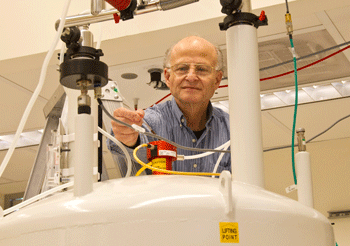- Home
- /
- News and Events
- /
- News Releases
- /
- Release
- /
UAlbany RNA Institute Drives Cutting-Edge Medical Science
![]() View the photo/gallery
(Adobe Flash file, requires Adobe Flash Plug-in)
View the photo/gallery
(Adobe Flash file, requires Adobe Flash Plug-in)
Institute Director Paul F. Agris will head a cooperative R&D alliance among leading biomedical scientists and researchers
Contact(s): Catherine Herman (518) 956-8150
 |
The University's Life Sciences Research Building houses The RNA Institute, directed by biochemist and researcher Paul F. Agris. (Photo Mark Schmidt) |
ALBANY, N.Y. (June 4, 2010) -- A powerful new alliance of top genetic scientists and biomedical investigators from the New York Capital Region will spur cutting-edge research into RNA and its implications for innovative medicines, drug therapies and technologies, and curing disease.
University at Albany President George M. Philip today launched The RNA Institute, joined by SUNY Chancellor Nancy L. Zimpher, Congressman Paul D. Tonko, state legislators, and University supporters.
In conjunction with scientific discovery and research, The RNA Institute will offer resources for small, medium and large biomedical businesses to spur the development of start-up companies, new R&D centers, and related business operations in New York State through public-private partnerships. In collaboration with the University's School of Business, The RNA Institute will offer researchers tools and strategies to assess the marketplace and successfully develop and commercialize intellectual property in the Capital Region.
The Institute, under the auspices of the University's College of Arts and Sciences and located in the Life Sciences Research Building, will be directed by Paul F. Agris, renowned biochemistry innovator and expert in nucleic acid design. Agris came from North Carolina State University, where he was a professor of biochemistry in the Department of Molecular and Structural Biochemistry, and, for 14 years, headed the RNA Society of North Carolina. Agris is joined by Daniele Fabris, chair of the Institute's Internal Scientific Advisory Board and most recently a professor of chemistry at the University of Maryland, Baltimore County.
The RNA Institute, comprising more than 35 principal corporate, government, and university research entities that employ more than 200 staff members in New York's Capital Region alone, serves as a sustainable resource for the research and discovery of medical interventions and diagnostics aimed at treating a range of human and hard-to-treat diseases -- from breast cancer to drug-resistant bacterial and viral infections, drug-resistant TB and HIV, depression, and neurodegenerative and neuromuscular disorders such as ALS and neurofibromatosis.
"Some of the best researchers in the world are right here in New York State, working on highly innovative ventures," said Chancellor Zimpher. "The RNA Institute will create a comprehensive development chain, from research and development through commercialization, that will foster jobs, industry growth, and have a strong impact on the economic revitalization of the state."
"UAlbany has assembled a highly skilled and dedicated team committed to harnessing RNA for the development of medical care for the nation and the world," said UAlbany President Philip.
"Today we're faced with some of the most severe diseases encountered by mankind, and they require a new paradigm to solve and eliminate them. RNA medicine is that paradigm," said Director Agris. "It's the mission of The RNA Institute to design, develop, and test the efficacy of RNA-based medicines, and make them accessible to the world."
"The School of Business is pleased to be working with the RNA Institute on two fronts: to develop new courses in life sciences entrepreneurship and to facilitate the commercialization of intellectual property generated by its faculty and students. Professor Agris understands how to bring ideas to the marketplace. He is the quintessential academic entrepreneur," said UAlbany School of Business Dean Donald Siegel.
 |
The RNA Institute's biomedical investigators conduct cutting-edge research into RNA and its implications for innovative medicines, drug therapies and technologies, and curing disease. (Photo Mark Schmidt) |
RNA Research
Research at the Institute will focus on ribonucleic acid, or RNA, a powerful molecule that can turn genes "on and off." The power and promise of RNA has in recent years been recognized by the scientific community, with three Nobel Prizes for discoveries in RNA biology going to eight researchers in the past four years. Two 2009 Nobel Laureates are collaborators of Agris, and one provides strategic guidance by serving on the Institute's external Scientific Advisory Board. Pharmaceutical companies have also recognized the power and growth potential of RNA-based biomedicines, as evidenced by Merck�s $1.1 billion acquisition of Sirna Therapeutics, GlaxoSmithKline's $1.5 billion alliance with Isis Pharmaceuticals, Roche�s $1 billion agreement with Alnylam Pharmaceuticals, and Novartis� $700 million alliance with Alnylam.
What is RNA?
The entire human genetic code is contained in the deoxyribonucleic acid, or DNA, found in the nucleus of every cell. DNA, which encodes our genes and is packaged into chromosomes, contains the information needed for the production of proteins. Proteins, the final product of our genes, are responsible for cell development and maintenance. Whereas DNA is a blueprint for proteins and their synthesis, RNAs have many functions within the cell, including hosting a copy of the instructions for protein production from DNA, to being part of the "machinery" that produces proteins and having the role of the on-off switch for the control of protein production.
Science has long known that human disease results when proteins go awry or are not manufactured in the quantity required by the cell. However, a century of pharmaceutical development has not, in general, targeted the steps controlling protein production; rather, companies have concentrated on drugs to treat disease by binding to the end product, the protein gone awry. This approach to drug development has reached its limits of treating disease.
In contrast, the Institute's work will concentrate on RNA as a novel therapeutic target and as a unique drug class to address problems along the many steps of protein production. This approach has nearly unlimited ability to treat problematic human diseases with many more opportunities to fix the final protein product. Institute researchers are expanding drug discovery by designing, synthesizing and testing the delivery of therapeutics to destroy or neutralize the disease-causing RNA function. This will require new and adapted technologies.
"The public-private partnerships envisioned by the Institute reflect a top priority of Congress and the State of New York," said Rep. Tonko. "We support innovation in medical technology and small business entrepreneurship for their potential to cure, create jobs, and grow the economy."
"Research and discovery are at the very foundation of this university. Supporting The RNA Institute as it deciphers the mysteries of RNA and applies its power to therapies and innovative medical solutions to specific human diseases is a top priority of the College of Arts and Sciences," said Dean Edelgard Wulfert.
"We at Cornell University are one of the many potential collaborators and future partners working with The RNA Institute, and will benefit from the state-of-the-art scientific research and technology that is being organized," said Jack Henion, emeritus professor of toxicology at Cornell University and chairman and CSO of Advion Biosciences, Inc. "No existing centers of excellence in the field in New York, New England, or the nation that have so clearly enunciated the mission and vision of The RNA Institute toward difficult human diseases."
"Bruker Daltonics is very pleased to be involved in a collaboration on the applications of its high performance FTMS mass spectrometer to the study of RNA at the Institute. We are impressed with the excellent team of scientists that Professor Agris has assembled, as well as the world class facility, and we look forward to the exciting research results and technology that will undoubtedly be produced at the new institute," said Gary H. Kruppa, vice president of business development of Bruker Daltonics.
RNA Institute Director Paul F. Agris
Paul Agris earned a bachelor's degree in biology and chemistry from Bucknell University with honors, and a doctorate in biochemistry from the Massachusetts Institute of Technology. He was a National Cancer Society and Damon Runyon Memorial Fund Cancer Research Fellow at Yale University in molecular biophysics and biochemistry.
Agris came to UAlbany from North Carolina State University, where he was professor of biochemistry in the Department of Molecular and Structural Biochemistry, chairing the department from 1988 to 1993. In addition to his faculty position, he founded the RNA Society of North Carolina, which he chaired for 14 years, and established and has been the chairman of the international Symposia on RNA Biology. Agris co-founded the drug technology company NEOS Discovery, Inc. (now TRANA Discovery) in 2000, and is the founder of SIRGA Advanced Biopharma, Inc.
All of the intellectual property coming from Agris's research to date has been licensed to various companies. He has been a consultant to pharmaceutical and diagnostic companies and an associate editor of RNA Biology since its inception in 2005. He has three patents to his credit and two pending.
Agris's interest in the basic and applied aspects of RNA chemistry and structure, has been supported continuously from 1974 through grants from the National Science Foundation, the National Institutes of Health, United Mitochondrial Disease Foundation, Kenan Institute, Varian Corporation, Dharmacon RNAi Technologies, and other firms.
Over the course of Agris's academic and scientific career, he has published more than 130 journal articles, six book chapters and three books.
![]() For more news, subscribe to UAlbany's RSS headline feeds
For more news, subscribe to UAlbany's RSS headline feeds
Educationally and culturally, the University at Albany-SUNY puts "The World Within Reach" for its 18,000 students. An internationally recognized research university with 58 undergraduate majors and 128 graduate degree programs, UAlbany is a leader among all New York State colleges and universities in such diverse fields as public policy, nanotechnology and criminal justice. With a curriculum enhanced by 300 study-abroad opportunities, UAlbany launches great careers. For more information about this globally ranked University, visit www.albany.edu. For UAlbany's extensive roster of faculty experts, visit www.albany.edu/news/experts.shtml.


